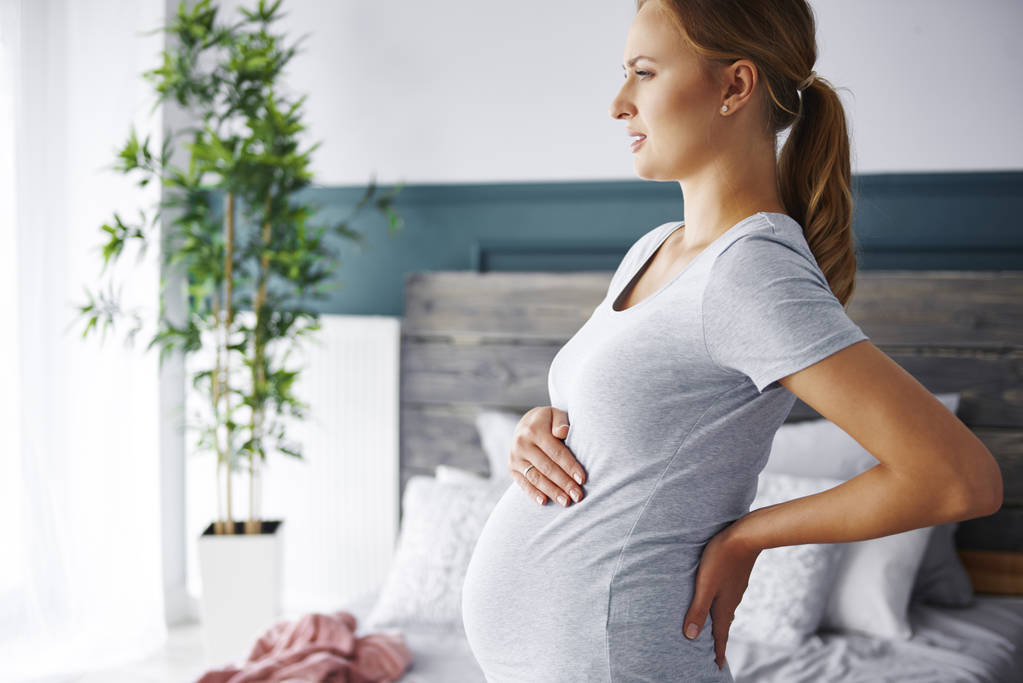Learn how to distinguish between normal and severe back pain during pregnancy.
How to Differentiate Between Normal and Severe Back Pain During Pregnancy
Welcome to the wonderful world of pregnancy, where your body goes through countless changes and surprises. One of these surprises can be the onset of back pain. But don’t worry, mama-to-be! In this article, we’ll help you navigate the confusing realm of back pain during pregnancy and teach you how to distinguish between normal aches and severe discomfort. So sit back (carefully!) and let’s dive in!

Understanding Back Pain During Pregnancy
First things first, let’s get acquainted with the basics of pregnancy and back pain. As your belly grows and your little one starts putting on weight, it’s natural for your body to experience some discomfort. Your back, in particular, may feel the burden of this beautiful process.
The Basics of Pregnancy and Back Pain
During pregnancy, the body undergoes hormonal and physical changes that can contribute to back pain. As your baby bump expands, your center of gravity shifts forward, causing your back muscles to work harder. Additionally, hormones like relaxin loosen your ligaments and joints, which can lead to misalignment and strain on your back.
Why Does Back Pain Occur in Pregnancy?
Now, let’s explore why the stork brings you back pain along with the joyful news of pregnancy. The primary culprits include the weight gain associated with baby’s growth and the changes in your body’s alignment and posture. The muscles and ligaments in your back are working overtime to support your changing shape and can sometimes protest with an achy chorus.
Weight gain during pregnancy is a natural and necessary part of the process. As your baby grows, so does the amount of amniotic fluid, placenta, and blood volume in your body. This increase in weight can put additional strain on your back, especially as your center of gravity shifts forward. The extra pounds can cause your back muscles to work harder to maintain balance and support your growing belly.
In addition to the physical changes, hormonal changes also play a role in back pain during pregnancy. Relaxin, a hormone produced by the ovaries and placenta, helps to loosen the ligaments and joints in your body in preparation for childbirth. While this is essential for the birthing process, it can also lead to misalignment and strain on your back. The loosened ligaments and joints can make your back more susceptible to injury and discomfort.
Furthermore, as your baby bump expands, your body’s alignment and posture naturally change. Your spine may curve more as it adjusts to the weight and shape of your growing belly. This change in alignment can put additional pressure on certain areas of your back, leading to pain and discomfort.
It’s important to note that every woman’s experience with back pain during pregnancy is unique. Some may experience mild discomfort, while others may have more severe pain. Factors such as pre-existing back conditions, posture, and physical activity levels can also influence the severity of back pain during pregnancy.
While back pain during pregnancy can be challenging, there are strategies to help alleviate the discomfort. Maintaining good posture, practicing gentle exercises and stretches specifically designed for pregnant women, using supportive pillows, and seeking professional help such as physical therapy or chiropractic care can all contribute to relieving back pain.
Remember, pregnancy is a beautiful journey, and while back pain may be a part of it, there are ways to manage and minimize the discomfort. Taking care of your body and seeking support from healthcare professionals can help you navigate this exciting time with greater ease.
Identifying Normal Back Pain in Pregnancy
So, how do you know if your back pain is within the realm of “normal” during pregnancy? Let’s shed some light on the subject.
During pregnancy, the body goes through numerous changes to accommodate the growing baby. These changes can put strain on various parts of the body, including the back. It is not uncommon for pregnant women to experience back pain, but it is essential to distinguish between normal discomfort and potential complications.
Common Causes of Normal Back Pain
Normal back pain in pregnancy often stems from activities like standing or sitting for extended periods, poor posture, or lifting heavy objects incorrectly (although you’ll probably have your partner on lifting duty for a while!). It can also arise from the strain placed on your back muscles as your baby grows.
Standing or sitting for long periods can lead to muscle fatigue and strain, especially as the body’s center of gravity shifts due to the growing belly. Poor posture, such as slouching or hunching over, can further exacerbate the strain on the back muscles. Additionally, lifting heavy objects incorrectly can put undue stress on the back, leading to discomfort.
As the baby grows, the uterus expands, and the weight distribution in the body changes. This shift in weight can cause the back muscles to work harder to maintain balance and support the spine. The added strain on the muscles can result in back pain.
Symptoms of Normal Back Pain
Normal back pain during pregnancy tends to be accompanied by mild to moderate discomfort that comes and goes. It may feel like a dull ache or stiffness in your lower back, and it typically improves with rest or changes in position.
It is important to note that normal back pain does not usually radiate down the legs or cause numbness or tingling sensations. If you experience any of these symptoms, it is advisable to consult with your healthcare provider to rule out any underlying conditions.
Furthermore, normal back pain in pregnancy does not typically worsen over time or interfere significantly with daily activities. While it may be uncomfortable, it should not prevent you from carrying out your regular tasks.
Resting, changing positions, and practicing good posture can often alleviate normal back pain during pregnancy. Engaging in gentle exercises and stretches specifically designed for pregnant women can also help strengthen the back muscles and provide relief.
Remember, each pregnancy is unique, and what may be considered normal for one person may not be the same for another. If you have any concerns or doubts about your back pain, it is always best to consult with your healthcare provider for personalized advice and guidance.
Recognizing Severe Back Pain During Pregnancy
While normal back pain may make its presence known, severe back pain requires a more discerning eye. Let’s find out how to spot it, shall we?
During pregnancy, the body goes through numerous changes to accommodate the growing baby. These changes can put strain on the back, leading to discomfort and pain. While some level of back pain is considered normal during pregnancy, severe back pain should not be ignored.
Warning Signs of Severe Back Pain
Severe back pain during pregnancy often presents as a constant or intensifying ache, shooting pains down your legs, or a sharp, stabbing sensation in your back. These symptoms can make it difficult for pregnant individuals to perform daily activities and may significantly impact their quality of life.
However, it’s important to note that not all back pain during pregnancy is severe. Some pregnant individuals may experience mild to moderate back pain, which can be managed with proper self-care techniques such as gentle exercises, heat or cold therapy, and good posture.
So, how can you differentiate between normal back pain and severe back pain during pregnancy? One key factor to consider is the presence of accompanying symptoms. If the pain is accompanied by fever, chills, loss of bladder or bowel control, or contractions, it’s crucial to seek medical attention immediately. These symptoms may indicate a more serious underlying condition that requires prompt evaluation and treatment.
Potential Complications from Severe Back Pain
Severe back pain during pregnancy can be an indication of underlying issues, such as a urinary tract infection, kidney stones, or even preterm labor. It’s important to address severe back pain promptly to prevent any potential complications.
Urinary tract infections (UTIs) are common during pregnancy and can cause severe back pain. UTIs occur when bacteria enter the urinary tract, leading to infection. If left untreated, UTIs can progress and potentially cause kidney infections, which can be harmful to both the pregnant individual and the baby.
Kidney stones, another possible cause of severe back pain during pregnancy, are hard deposits that form in the kidneys. These stones can cause intense pain as they pass through the urinary tract. Pregnant individuals with a history of kidney stones may be more prone to experiencing severe back pain during pregnancy.
Furthermore, severe back pain during pregnancy can also be a sign of preterm labor. Preterm labor refers to the onset of labor before the 37th week of pregnancy. It is a serious concern as it increases the risk of complications for both the mother and the baby. Therefore, any signs of severe back pain accompanied by contractions should be evaluated by a healthcare professional immediately.
In conclusion, while back pain is a common complaint during pregnancy, severe back pain should not be taken lightly. Recognizing the warning signs and potential complications associated with severe back pain is crucial for the well-being of both the pregnant individual and the baby. If you experience severe back pain during pregnancy, it is always best to consult with your healthcare provider for proper evaluation and guidance.
When to Seek Medical Attention
Knowing when to reach out to your healthcare provider can provide both peace of mind and necessary medical intervention. Let’s go over some important considerations.
Timing and Frequency of Pain
If your back pain is persistent, severe, or occurs in combination with contractions, it’s time to pick up the phone and give your doctor or midwife a call. It’s better to be safe than sorry, and they can guide you through appropriate next steps.
Other Symptoms to Watch For
In addition to severe pain, pay attention to other symptoms like fever, burning during urination, blood in your urine, difficulty walking or standing, or radiating pain. These signs could indicate an underlying condition that requires medical attention.
Managing Back Pain During Pregnancy
Now that we’ve covered the differences between normal and severe back pain, let’s focus on some strategies to manage the discomfort.

Safe Pain Relief Options
When it comes to finding relief, there are some safe options available during pregnancy. Consider using heat or cold packs on your back, practicing gentle stretches and exercises recommended by your healthcare provider, or using a pregnancy support belt to alleviate pressure on your lower back.
Exercises and Posture Adjustments
Besides pain relief, certain exercises and posture adjustments can work wonders in keeping back pain at bay. Strengthening your core muscles, improving your posture, and practicing gentle prenatal yoga can all contribute to a healthier, more supported back.
Now that you’re armed with the knowledge to differentiate between normal and severe back pain during pregnancy, you can navigate the ups and downs of this incredible journey with confidence and comfort. Remember, it’s a temporary discomfort that serves as a reminder of the miraculous process happening within you. So go forth, mama-to-be, and embrace your pregnancy glow while keeping that back pain in check!



